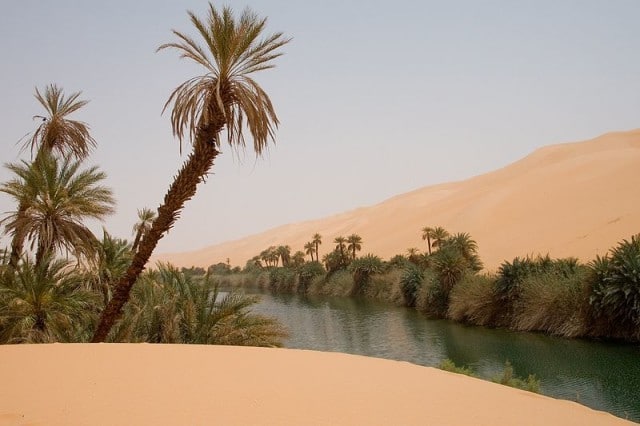El más alegre de todos los salmos, por Atar Hadari (inglés)

De Mosaic
Embedded in the Hebrew prayer book is a particularly beautiful psalm that also happens to be longer than most poems found in the siddur. The beauty is not all that surprising—there’s no dearth of beautiful poetry in those pages; what’s surprising is how often, and in how many different Jewish liturgical traditions, either part or all of this particular poem has been slipped into the service. Why, with so many psalms to choose from, should Psalm 104, known in Hebrew by its opening words, barkhi nafshi, be singled out? And why, especially, once a month like clockwork, does it appear at the very end of the morning service, just when most weekday worshippers are fretting at the lateness of the hour and anxious to get to their day jobs?
Perhaps the appeal of Barkhi nafshi is related to the way it restages the entire story of Creation but adds a happy ending. True, the Creation story itself, as told in the book of Genesis, ends happily enough with the arrival of the Sabbath on the seventh day. But pretty soon thereafter things begin to degenerate: remember the snake in the garden, remember the Flood? Let’s face it, in Genesis the Lord falls out pretty quickly with mankind; the book’s very first Torah reading ends on this grim note: “And God regretted that He made man upon the earth, and was aggrieved in His heart.”
By contrast, Psalm 104 goes right back to the beginning and takes a stab at making it all come out better. Not only that, but by focusing on how happy the Lord remains with what He has made, the poem also makes Him seem much less (if I may be permitted) irritable.
Here’s how it opens:
My being—bless the Lord!
Lord my God You’ve become so great,
You arrayed Yourself in might and splendor
And wrapped Yourself in light like a dress. . . .
These verses bring us right back to the early lines of Genesis. But instead of God’s disembodied voice intoning “Let there be light,” here the Lord is not just anthropomorphized but domesticated, gearing up for His week of creating by throwing on His cloak. I know many men who love saying these lines each morning as they wrap themselves in their prayer shawls—and maybe, just maybe, snagging a little bit of that divine light as they move into prayer.
The poem then proceeds through Creation:
. . . You spread the heavens like a canvas,
You who made ceilings in the heavens,
Who appoints clouds as His chariot
To wander on the wings of the wind;
Who appoints the winds as His messengers,
His servants as scalding fire;
Who established the earth on its foundation
So it won’t fall till the end of time.
You covered the depth with a raiment,
Waters stood over the mountaintops;
From Your scolding they scattered,
At the sound of Your thunder they ran;
The mountains rose and valleys fell
To the place You established for them;
You set a border, streams can’t pass it,
So they won’t return to cover the earth.
In these lines we have an upbeat recapitulation not only of the opening days of Creation—the heavens and earth, the ground coming up out of the sea, and so forth—but also of the onset and aftermath of the annihilating Flood. But missing in this version are the Almighty’s despair over the degraded moral state of men as they rape their way across the earth and His resolve to finish off every living thing on earth; we see Him only after the fact, redistributing the waters and chiding them never to inundate the earth again. It’s a kind of reversed film, tactfully eliding the Lord’s interval of wrath by cutting immediately to an image of Him shooing the errant waters back into place. (…)
Seguir leyendo en Mosaic
***
Salmo 104
¡Alma mía, bendice a Yahveh! ¡Yahveh, Dios mío, qué grande eres! Vestido de esplendor y majestad,
arropado de luz como de un manto, tú despliegas los cielos lo mismo que una tienda,
levantas sobre las aguas tus altas moradas; haciendo de las nubes carro tuyo, sobre las alas del viento te deslizas;
tomas por mensajeros a los vientos, a las llamas del fuego por ministros.
Sobre sus bases asentaste la tierra, inconmovible para siempre jamás.
Del océano, cual vestido, la cubriste, sobre los montes persistían las aguas;
al increparlas tú, emprenden la huida, se precipitan al oír tu trueno,
y saltan por los montes, descienden por los valles, hasta el lugar que tú les asignaste;
un término les pones que no crucen, por que no vuelvan a cubrir la tierra.
Haces manar las fuentes en los valles, entre los montes se deslizan;
a todas las bestias de los campos abrevan, en ellas su sed apagan los onagros;
sobre ellas habitan las aves de los cielos, dejan oír su voz entre la fronda.
De tus altas moradas abrevas las montañas, del fruto de tus obras se satura la tierra;
la hierba haces brotar para el ganado, y las plantas para el uso del hombre, para que saque de la tierra el pan,
y el vino que recrea el corazón del hombre, para que lustre su rostro con aceite y el pan conforte el corazón del hombre.
Se empapan bien los árboles de Yahveh, los cedros del Líbano que él plantó;
allí ponen los pájaros su nido, su casa en su copa la cigüeña;
los altos montes, para los rebecos, para los damanes, el cobijo de las rocas.
Hizo la luna para marcar los tiempos, conoce el sol su ocaso;
mandas tú las tinieblas, y es la noche, en ella rebullen todos los animales de la selva,
los leoncillos rugen por la presa, y su alimento a Dios reclaman.
Cuando el sol sale, se recogen, y van a echarse a sus guaridas;
el hombre sale a su trabajo, para hacer su faena hasta la tarde.
¡Cuán numerosas tus obras, Yahveh! Todas las has hecho con sabiduría, de tus criaturas está llena la tierra.
Ahí está el mar, grande y de amplios brazos, y en él el hervidero innumerable de animales, grandes y pequeños;
por allí circulan los navíos, y Leviatán que tú formaste para jugar con él.
Todos ellos de ti están esperando que les des a su tiempo su alimento;
tú se lo das y ellos lo toman, abres tu mano y se sacian de bienes.
Escondes tu rostro y se anonadan, les retiras su soplo, y expiran y a su polvo retornan.
Envías tu soplo y son creados, y renuevas la faz de la tierra.
¡Sea por siempre la gloria de Yahveh, en sus obras Yahveh se regocije!
El que mira a la tierra y ella tiembla, toca los montes y echan humo.
A Yahveh mientras viva he de cantar, mientras exista salmodiaré para mi Dios.
¡Oh, que mi poema le complazca! Yo en Yahveh tengo mi gozo.
¡Que se acaben los pecadores en la tierra, y ya no más existan los impíos! ¡Bendice a Yahveh, alma mía!
Traducción Biblia de Jerusalén

